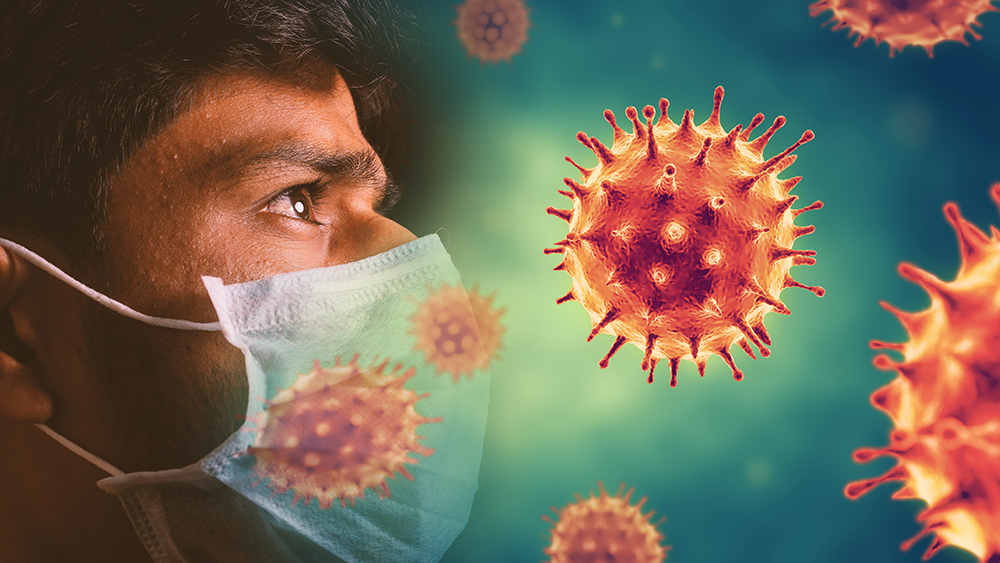
Jim Naismith, a University of Oxford professor, argued that the new face mask mandate imposed in England is unlikely to have much impact in fighting off the spread of the omicron variant of the Wuhan coronavirus (COVID-19).
Face coverings are again compulsory in shops, public transport and other venues that have been chosen by the British government. Many highlighted the rules as absurd, as face masks are mandatory when buying takeaways but not in restaurants for sit-down meals.
Naismith noted that the masks are largely pointless.
"The Office for National Statistics (ONS) survey results on prevalence shows that the Scottish and English approach to masking, although formally different since July, has made no meaningful difference to delta," he said.
"In both countries very high levels of prevalence have continued for months. Thus the new changes announced are unlikely to have much of an impact if omicron does indeed spread rapidly."
Despite England dropping their mask mandates and Scotland keeping them in place after July, ONS reports showed that infection rates were actually higher in Scotland. Comparisons between case rates in Sweden and the rest of Europe are also interesting and revealing.
Scientific Advisory Group for Emergencies (SAGE) Adviser Dr. Colin Axon, who previously dismissed masks as "comfort blankets" that essentially do nothing, noted that COVID-19 virus particles are up to 5,000 times smaller than the holes in the mask.
He compared the imperfect analogy of wearing masks to marbles fired at scaffolding: Some may hit a pole and rebound, but most will fly through.
With this in mind, the original statement of Dr. Anthony Fauci was correct – that face masks are pointless. However, as soon as they received the "memo," their rhetoric on the face coverings changed.
Fines await those who will refuse to wear face masks in England
Beginning Tuesday, Nov. 30, shoppers and travelers in England will face fines of £200 ($266.2) for refusing to wear masks with the penalties expected to double for each offense to a maximum of £6,400 ($8,520.8).
Experts remain divided on the ability of face masks to prevent the spread of COVID-19. Some believe that they are only useful when social distancing cannot be maintained, while others think they prevent picking up virus particles in the air.
Robert Dingwall, a professor of sociology at Nottingham Trent University and a former government COVID adviser, shared that while they can say with confidence that the extra restrictions in nations do not seem to be having much effect, the trajectory of infections does not differ markedly from that in England.
"We cannot then go on to single out one element and draw conclusions about that. Mask mandates are only one part of the package, and the comparisons often lack details about enforcement and compliance," he said. (Related: New "Omicron" variant so far detected ONLY in the "fully vaccinated.")
"I hear, for example, that Aberdeen is much more relaxed than either Glasgow or Edinburgh – and I suspect that once you get into smaller towns there is very little going on. In my view, the only thing that really has an impact on transmission is working from home and reducing social contacts altogether."
In September, a study involving 350,000 people in rural Bangladesh found that masks reduced symptomatic COVID cases in villages by nine percent, but a recent reappraisal showed that the difference between the intervention and controlled villages was only 20 cases out of over 2,000 infections over eight weeks.
Countries like Germany, which mandated medical grade masks in indoor spaces beginning January, saw a large increase in cases despite their measures. France introduced mask fines with widespread mask-wearing compliance only to see continuing rising cases.
Still, some scientists believe that masks can help when used with other interventions.
"Protection is not black and white – masking, social distancing and improved ventilation just reduce these risks, they do not remove them completely," said Dr. Julian Tang of the University of Leicester.
"So wearing any mask or face covering – cloth or surgical – is better than none, some degree of social distancing is better than none, some ventilation is better than none. A combination of these is also better than just one."
Read more news related to the coronavirus pandemic at Pandemic.news.
Sources include:
Please contact us for more information.



















